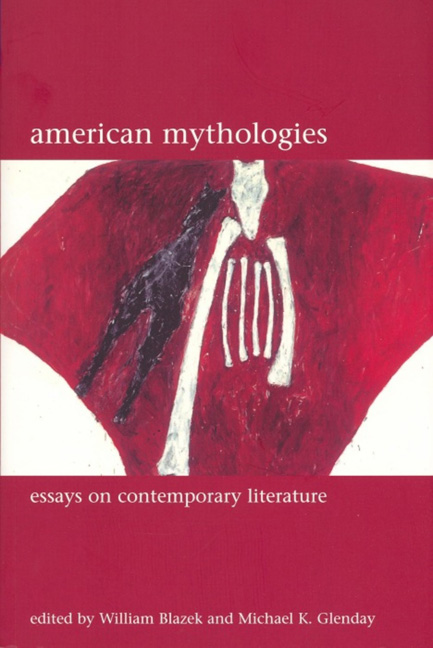Book contents
- Frontmatter
- Dedication
- Contents
- Acknowledgements
- Introduction
- 1 Indians with Voices: Revisiting Savagism and Civilization
- 2 Wild Hope: Love, Money and Mythic Identity in the Novels of Louise Erdrich
- 3 Float Like a Butterfly, Sting Like a Bee: Mythologies of Representation in Selected Writings on Boxing by Norman Mailer
- 4 The Secret Sharing: Myth and Memory in the Writing of Jayne Anne Phillips
- 5 The Individual's Ghost: Towards a New Mythology of the Postmodern
- 6 ‘Cheap, On Sale, American Dream': Contemporary Asian American Women Writers’ Responses to American Success Mythologies
- 7 ‘No Way Back Forever’: American Western Myth in Cormac McCarthy's Border Trilogy
- 8 Native American Visions of Apocalypse: Prophecy and Protest in the Fiction of Leslie Marmon Silko and Gerald Vizenor
- 9 The Brave New World of Computing in Post-war American Science Fiction
- 10 Mythologies of ‘Ecstatic immersion’: America, The Poem and the Ethics of Lyric in Jorie Graham and Lisa Jarnot
- 11 Whose Myth is it Anyway? Coyote in the Poetry of Gary Snyder and Simon J. Ortiz
- 12 Aging, Anxious and Apocalyptic: Baseball's Myths for the Millennium
- 13 Finding a Voice, Telling a Story: Constructing Communal Identity in Contemporary American Women's Writing
- Notes on Contributors
- Index
5 - The Individual's Ghost: Towards a New Mythology of the Postmodern
- Frontmatter
- Dedication
- Contents
- Acknowledgements
- Introduction
- 1 Indians with Voices: Revisiting Savagism and Civilization
- 2 Wild Hope: Love, Money and Mythic Identity in the Novels of Louise Erdrich
- 3 Float Like a Butterfly, Sting Like a Bee: Mythologies of Representation in Selected Writings on Boxing by Norman Mailer
- 4 The Secret Sharing: Myth and Memory in the Writing of Jayne Anne Phillips
- 5 The Individual's Ghost: Towards a New Mythology of the Postmodern
- 6 ‘Cheap, On Sale, American Dream': Contemporary Asian American Women Writers’ Responses to American Success Mythologies
- 7 ‘No Way Back Forever’: American Western Myth in Cormac McCarthy's Border Trilogy
- 8 Native American Visions of Apocalypse: Prophecy and Protest in the Fiction of Leslie Marmon Silko and Gerald Vizenor
- 9 The Brave New World of Computing in Post-war American Science Fiction
- 10 Mythologies of ‘Ecstatic immersion’: America, The Poem and the Ethics of Lyric in Jorie Graham and Lisa Jarnot
- 11 Whose Myth is it Anyway? Coyote in the Poetry of Gary Snyder and Simon J. Ortiz
- 12 Aging, Anxious and Apocalyptic: Baseball's Myths for the Millennium
- 13 Finding a Voice, Telling a Story: Constructing Communal Identity in Contemporary American Women's Writing
- Notes on Contributors
- Index
Summary
In Brian McHale's 1987 study Postmodernist Fiction, the literature that the author discusses has a gender and a race although gender and race are never mentioned. While the jacket copy extols the inclusiveness of a frame that brings together Beckett, Robbe-Grillet, Fuentes, Nabokov, Coover and Pynchon, the absence of any women and particularly any women of colour leads a cultural critic to question what it is about the idea of ‘postmodern fiction’ that would produce a list so clearly inflected by race and gender but marked by the absence of acknowledgement of these issues. What particular notion of the postmodern literary aesthetic would lead McHale or other writers to ignore the contributions of white women and women of colour? Why would a writer like Kathy Acker, who so clearly exemplifies the criterion for ‘postmodernism’ that McHale outlines, not even appear in his index? And while the absence of Acker is perhaps the most startling, when one thinks about many contemporary women writers and the formal features that characterize their works – such as two of the primary definitions Linda Hutcheon delineates in her introduction to A Postmodern Reader, ‘the assertion of the value of inclusive “both/and thinking” and the postmodern valuing of the local and a particular’ – it becomes difficult to make sense of the absence of writers such as Jean Rhys, Toni Morrison, Maxine Hong Kingston, Merce Rodoreda, Alice Walker, Jane Smiley and Louise Erdrich, from almost any catalogue of postmodern writers.
What assumptions could motivate their absence? In the institution of literary study, why has ‘postmodern fiction’ come to mean writers such as Donald Barthelme and John Barth, William Burroughs and William Gass, Italo Calvino and Gabriel García Márquez? Why is Morrison often aligned with ‘naturalist fiction’, or Walker with the ‘sentimental novel’, as if their work represents a kind of artistic ‘regression’ while the white males and a few male writers of colour represent ‘progression’ and formal innovation?
- Type
- Chapter
- Information
- American MythologiesNew Essays on Contemporary Literature, pp. 79 - 104Publisher: Liverpool University PressPrint publication year: 2005



